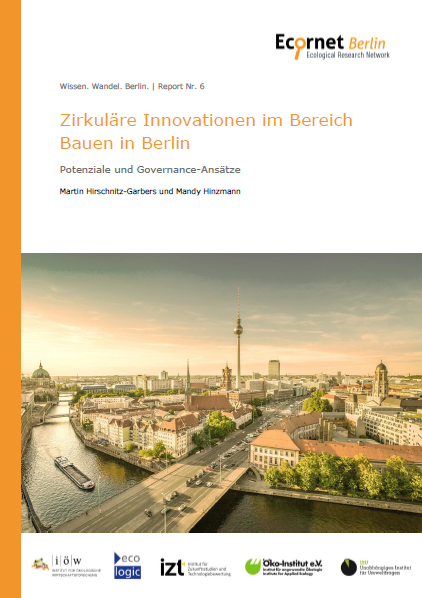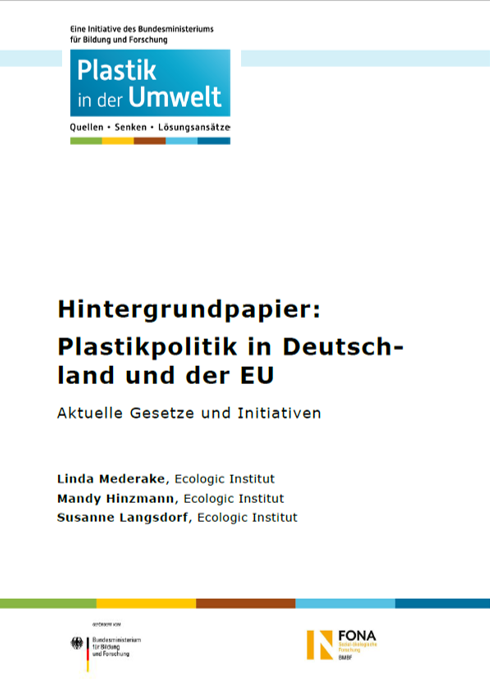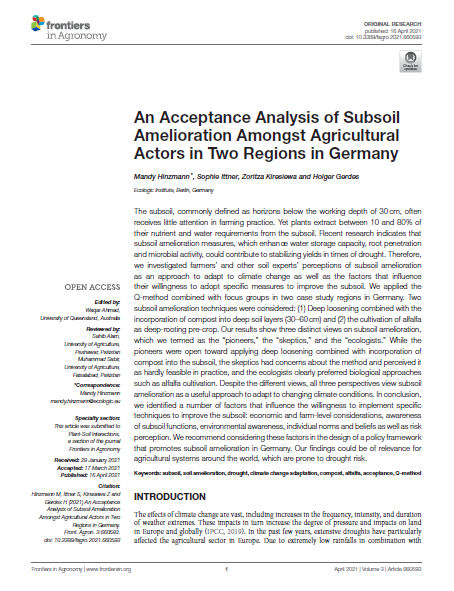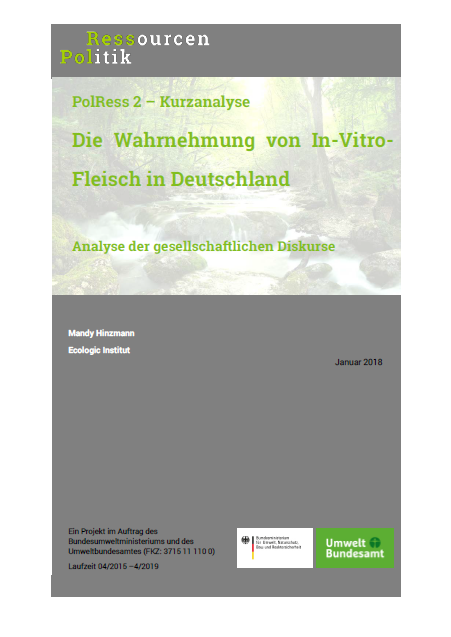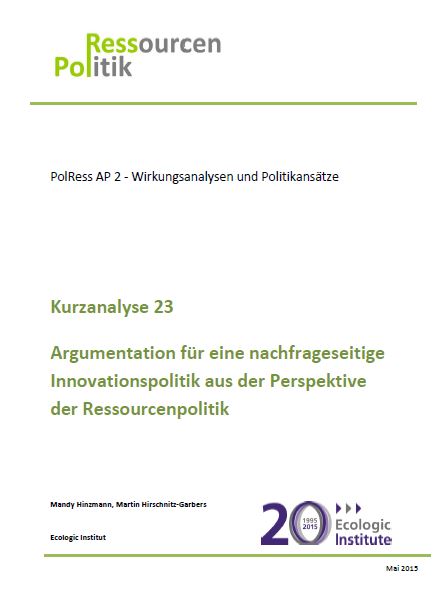
Mandy Hinzmann
MA (Sustainability Economics)
BA (International Political Management)
Fellow
- Team
- Topics
Mandy Hinzmann is a Fellow at Ecologic Institute. Her main research fields are circular economy, resource conservation, waste avoidance, eco-innovations and sustainable consumption. She is further interested in the nexus of resource conservation and climate protection policies. She works in German and English and has good knowledge of Spanish.
Her work focuses on the analysis of policy options aimed at conserving natural resources and establishing a circular economy. In particular, she investigates approaches to foster a circular textile economy. On behalf of the European Commission, Mandy Hinzmann co-authored a study on textile fibre recycling in the EU. For this, she analysed policy measures to promote high-quality textile recycling and to make the fashion industry more circular and sustainable. In the follow-up project to Circular City Berlin, Mandy Hinzmann will work on innovative concepts for the collection, sorting, recycling and reuse of discarded textiles.
Mandy Hinzmann also works on the topic of plastic pollution. She is currently coordinating the Ecologic Institute's contributions to the Citizen Science project "Plastic Pirates – Go Europe!". In addition, she supports research on circular economy approaches for plastics in the research program "Plastic in the Environment", funded by the German Federal Ministry of Education and Research (BMBF).
Before joining Ecologic Institute, Mandy Hinzmann worked at the Helmholtz Centre for Environmental Research (UFZ) in the Department of Environmental Politics.
Mandy Hinzmann studied Sustainable Economics at the University of Kassel (Germany). Prior to this she studied International Political Management at the Bremen University of Applied Science (Germany) and completed a semester abroad at the University of Concepción (Chile).
Contact Mandy Hinzmann by Email
Selected projects by Mandy Hinzmann
Circular Economy & Green Innovations
Technical, Regulatory, Economic and Environmental Effectiveness of Textile Fibres Recycling
- Duration
-
-
- Funding
-
European Commission, Directorate-General for Internal Market, Industry, Entrepreneurship and SMEs (DG GROW), International
Circular City Berlin – From potential towards implementation (CiBER 1)
- Duration
-
-
- Funding
-
Der Regierende Bürgermeister von Berlin, Senatskanzlei Wissenschaft und Forschung, Germany
Combating Plastic Pollution
Plastic Pirates – Go Europe!
- Duration
-
-
- Funding
-
Federal Ministry of Education and Research (BMBF), Germany
Plastic Pirates – Go Europe! – German campaign
- Duration
-
-
- Funding
-
Federal Ministry of Education and Research (BMBF), Germany
Nexus Climate Protection & Resource Conservation
Identifying and Assessing Interactions between International Climate and Resource Policy (ICARE)
- Duration
-
-
- Funding
-
German Environment Agency (UBA), Germany
Transformation to Climate Resilient and Resource-conserving Infrastructure (TRAFIS)
- Duration
-
-
- Funding
-
German Environment Agency (UBA), Germany
Sustainable Resource Policies
DYNAmic policy MIXes for Absolute Decoupling of Environmental Impact of EU Resource Use from Economic Growth (DYNAMIX)
- Duration
-
-
- Funding
-
European Commission, Directorate-General Research & Innovation (DG Research & Innovation), International
Research Network in Climate, Resource Efficiency and Raw Materials (RECREATE)
- Duration
-
-
- Funding
-
European Commission, Directorate-General Research & Innovation (DG Research & Innovation), International
Selected publications by Mandy Hinzmann
Circular Economy
Duhoux, Tom et al. 2021: Study on the technical, regulatory, economic and environmental effectiveness of textile fibres recycling. Final Report to the European Commission, Directorate-General for Internal Market, Industry, Entrepreneurship and SMEs. European Commission: Brussels.
Hirschnitz-Garbers, M., Araujo Sosa, A., Hinzmann, M., Exploring perspectives on climate-resource-nexus policies: barriers and relevance in different world regions, J.sustain. dev. energy water environ. syst., 1090408, DOI: https://doi.org/10.13044/j.sdewes.d9.0408
Hirschnitz-Garbers, M. and Hinzmann, M. (2021). Zirkuläre Innovationen im Bereich Bauen in Berlin –Potenziale und Governance-Ansätze (Wissen. Wandel. Berlin. Report Nr. 6). Berlin: Ecologic Institute, Forschungsverbund Ecornet Berlin.
Plastic Governance & Waste Avoidance
Mederake, Linda; Hinzmann, Mandy; Langsdorf, Susanne (2020): Hintergrundpapier: Plastikpolitik in Deutschland und der EU. Ecologic Institut: Berlin.
Fischer, Susanne; Mandy Hinzmann and Martin Hirschnitz-Garbers (2017). Stepping up Waste Prevention – Challenges and Opportunities for National Waste Prevention Programmes. RECREATE Project Policy Brief No. 7.
Green Innovations
Hinzmann M, Ittner S, Kiresiewa Z and Gerdes H (2021). An Acceptance Analysis of Subsoil Amelioration Amongst Agricultural Actors in Two Regions in Germany. Front. Agron. 3:660593. doi: 10.3389/fagro.2021.660593
Frelih-Larsen, A.; Hinzmann, M.; Ittner, S. (2018). The 'Invisible' Subsoil: An Exploratory View of Societal Acceptance of Subsoil Management in Germany. Sustainability 2018, 10, 3006.
doi:10.3390/su10093006
Hinzmann, Mandy (2018): Die Wahrnehmung von In-Vitro-Fleisch in Deutschland: Analyse der gesellschaftlichen Diskurse. Kurzanalyse im Projekt Ressourcenpolitik 2 (PolRess 2). www.ressourcenpolitik.de
Hinzmann, M. und Hirschnitz-Garbers, M. (2015): Argumentation für nachfrageseitige Innovationspolitik aus der Perspektive der Ressourcenpolitik. Kurzanalyse 23 im Projekt Ressourcenpolitik: Analyse der ressourcenpolitischen Debatte und Entwicklung von Politikoptionen (PolRess).
Selected presentations by Mandy Hinzmann
Speech:Fostering the Circular Economy in the Textiles Sector
- Date
-
- Location
- online, Ghana, Switzerland
Speech:Transforming Infrastructures towards Sustainability – lessons learnt from ICT-based peer-to-peer carsharing service Drivy in Germany
- Date
-
- Location
- Geneva, Switzerland






